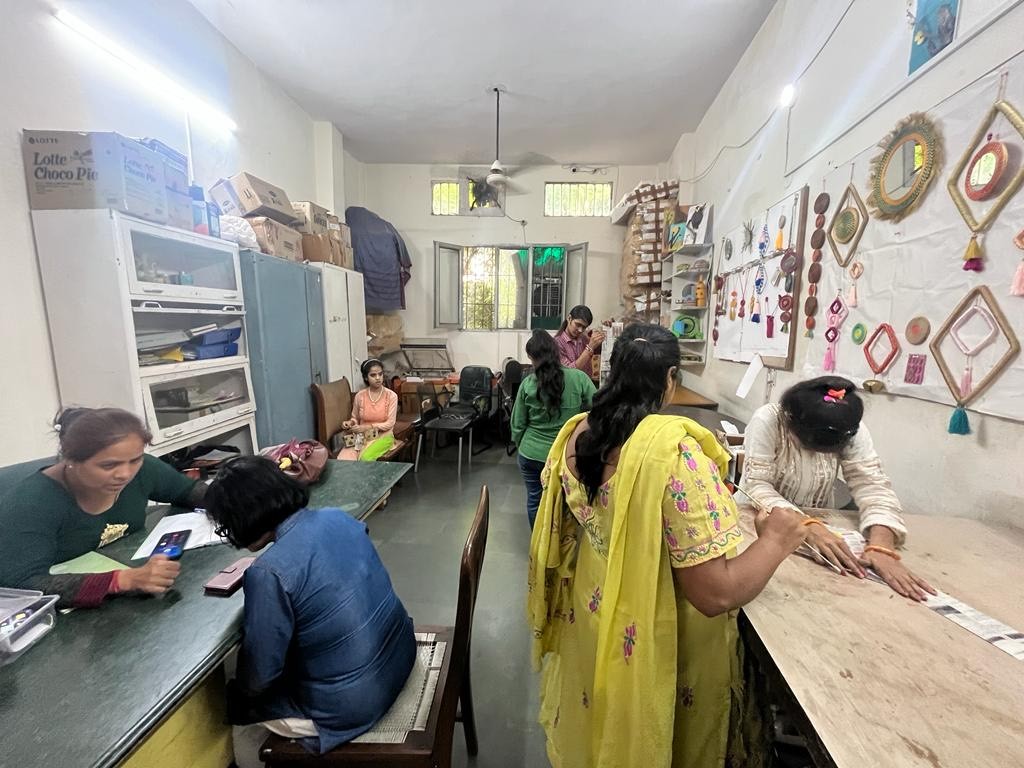
CHARTING OUT LIFE: Visually handicapped trainees learn the art of making handicrafts
We all have a perception that sight is essential in kitchen. But the Blind Bake Café, which is run by NAB India (Centre for Blind Women & Disability Studies), completely shatters that notion.
The café, located in Delhi’s bustling Hauz Khas neighbourhood, is altering people’s understanding of the visually disabled. It is disproving the belief that vision is essential for culinary skills.
Helen Keller, an American author and disability rights advocate, had once said, “The only thing worse than being blind is having sight but no vision.” This centre, however, is a living example of a vision.
Women, who are visually challenged, are excelling at cooking in this setting. They are being also empowered and educated.
The centre provides a variety of courses, including the nine-month “Discovery Hands” programme and four-month residential courses in customer service, orientation and mobility, talking hands, handicrafts and packing, blind-baking, and home science.
The trainees use smartphones and computer systems deftly, navigating the digital world with ease. They aren’t simply inventing gastronomic marvels; they are also shattering technological limits.
Several of them have received medical training along the way, and are bringing their expertise to the healthcare sector.
The centre also offers vocational training in customer service, computer competence (including software like JAWS and MS Office), internet usage, and communication skills for jobs in BPOs, contact centres, and front desk positions.
Additionally, the centre provides mobility and orientation instruction to these women on how to mentally map their surroundings and overcome barriers on their own.
Once they’ve finished training, the facility aids people in locating housing if they land a job.
The visually challenged women are also trained in techniques of dry and deep oil massage as well as anatomy and physiology.
Graduates have also found employment in the packaging industry, which requires a lot of motor skills, handicrafts, and corporate wellness centres like Tata Memorial Hospital.
They produce a range of items, including handmade paper, jewellery, diyas, charms, and more. A cutting-edge German project uses visually handicapped women’s enhanced sense of touch to assist in the early detection of breast cancer. These women can work with oncologists and gynaecologists as medical textile examiners after finishing a nine-month post-training computer and medical aptitude course.
Geetika Bansal, the receptionist at NAB India Centre for Blind Women & Disability Studies, said, “I am from Rajasthan, and because of my disability, I couldn’t leave my house since childhood. But I wanted to be independent despite having all I needed from my parents. I joined NAB at 25. After enrolling in the Customer Care Executive (CCE) course, I was able to get employment. My time at NAB has been wonderful. Everyone has given me constant support.”
She says she had never used computer before and it was very difficult to use it at first.
“My limited knowledge of English also made using English software a challenge. But with perseverance, I started learning, and now, despite being blind, I am independent. I have a strong sense that I am capable of doing anything,” said Geetika.
Geetika said that she wants to set an example for other disabled people.
“If you have the desire, anything is possible.”
Neha Suri, a teacher at NAB India, embarked on a path to empower others at the age of 43.
“I joined NAB India in 2017 as a trainee,” said Neha. “But I started my role as a computer trainer in 2019.”
Her journey began out of necessity as a single mother, with a 12-year-old child, seeking independence after her husband’s death in December 2016 due to cancer.
“I realised that if someone says ‘red dress’, I can now assume what they mean. However, there are people who don’t even know what red and green are. It’s my good luck that I am connected with NAB India.”
Neha wants people to recognise the potential of visually impaired individuals, saying, “Blind people can do much more than singing or dancing. They can use computers, and if they can use computers, they can also fly planes because they also work on technology. Families with blind members should send them to blind schools, encouraging self-dependence.”
Neha said that the journey to education for the visually impaired girls was not easy since the majority of them had never used technology like smartphones or computers.
“The basic problem is that computers work in English accents, and students don’t understand it.”
Neha, however, said that the organisation has helped them immensely, including providing them with financial support.
Delhi hosted what organisers describe as the world’s first player auction in golf, launching ‘72…
An elderly woman recalls how her six-year-old granddaughter lay bleeding after a speeding car hit…
Municipal Corporation of Delhi plans a unified policy enabling RWAs to adopt and maintain parks…
A 17-year-old boy allegedly died by suicide after jumping before a moving train at Uttam…
Delhi High Court grants bail to 26-year-old Thar driver accused of mowing down two in…
Two Rohini men arrested for fatally stabbing one person and injuring another during a robbery…